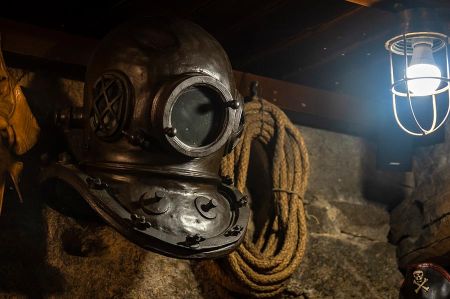Together with Sponge Divers in Bodrum / Turkey
- Written by Portal Editor
Turkey is the most important producer of bathing sponges. In May, the men of the villages around Bodrum set sail on their narrow boats along the western coast for five months to look for sponges.
During the last few years, Turkey has developed into the biggest producer of sponges world wide - ahead of Cuba, Mexico, the Antilles Islands, the United States of America and Greece.
Turkey exports about 15 tons of sponges ever year. Until the effects of tourism and a fungus epidemic in 1986 killed lots of sponges, diving for them was the most important job for the fishermen and their families in the Bodrum area.

Gold from the bottom of the ocean
"The best sponges have big holes and, after being squeezed, return to their original shape and size", explains Selim Dincer. He should know because he is a specialist in sponges working at the Bodrum Institute for Marine Biology.
A sponge diving team normally consists of five divers, one leader on the boat and a cook. They all belong to the team, living and working on a boat called as tirandil, built in the Bodrum area with a framework of wood and about 10 metres in length. One session of diving normally lasts about two to three hours. The equipment consists of a diving suit, a mask and, most important of all, the pump. Below the water, the diver breathes through a pipe called as nargile (water pipe) or "hookah". With the help of this equipment, divers can reach depths of 150 metres. But the deeper the diver goes, the bigger the risk to the diver, which can lead to long-term injury and even the death of a young diver. When someone is suffering from this problem, they need to be got into a decompression chamber within 24 hours.
Quite often sponge divers find wrecks of old ships or ancient amphoras. "When they cut a living sponge, it looks more or less like a glued piece of leather, much different than the sponge we know in our bathroom." So says an American author of books about marine biology when writing about animals without a spinal column. When freshly brought home from the sea, sponges look like stomach sacks.
The Sponge Divers of Bodrum: A Fascinating Chapter in Turkish History
The Origins of Sponge Diving in Bodrum
Sponge diving in Bodrum dates back to ancient times. Sponges were already being brought from the depths of the Mediterranean in the times of the ancient Greeks and Romans. The waters around Bodrum, with their clear waters and rich seabed, provided ideal conditions for sponge diving.
In the 19th and early 20th centuries, Bodrum was one of the most important centres for sponge diving in the Eastern Mediterranean. Sponges were extremely sought after at the time and were prized as luxurious household and bathing items in Europe and beyond.
The hard life of sponge divers
The divers often spent several minutes underwater to remove the valuable sponges from the rocks. The risks were high: from the risk of drowning to the so-called decompression sickness to attacks by marine animals.
The economic importance of sponge diving
For the people of Bodrum, sponge diving was long one of the main sources of income. The sponges were cleaned by hand, dried and then sold in the markets of Istanbul, Athens and even European capitals.
Over time, Bodrum became an international trading centre for sponges. Demand was high and many families lived exclusively from this business.
The decline of sponge diving
In addition, the increasing industrialization and tourism in Bodrum has increasingly displaced the profession of sponge diving. Today, there are only a few sponge divers left to keep the tradition alive.
The importance of sponge diving today
Although sponge diving in Bodrum no longer has the same economic importance as it once did, it remains an important part of the region's cultural identity. Museums and exhibitions, such as the Bodrum Museum of Underwater Archaeology, allow visitors to learn more about the history and techniques of sponge diving.
In addition, some shops in Bodrum still sell handmade sponges as a souvenir of this fascinating tradition.
Conclusion
A visit to Bodrum is not only an opportunity to enjoy the beauty of the Turkish Aegean, but also a journey into the past to discover the stories of the brave sponge divers who once shaped life in this region.
Please read as well: